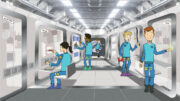Have you listened to the new Fun Kids series celebrating the Windrush Generation, The Windrush Story?
The series looks into the courageous immigrants from the Caribbean who came to Britain to help rebuild after the second world war.
We’re looking at what life was like for those new arrivals when they arrived in Britain.
What was it like when people arrived from the Caribbean into Britain?
The Empire Windrush arrived in Britain in June 1948, impressing its passengers when they passed the White Cliffs of Dover on their journey to Tilbury Docks.
Now, it might have been Summer but the weather that month was cool and many passengers soon found that the clothes they had brought weren’t warm enough. Some layered up to four shirts under their jackets to keep warm.
Most people had never been the Britain so things would have been very different to what was expected.

Where did people go when they stepped off the boat on 22nd June?
At least 236 people were housed in the Clapham South Deep Shelter in South London until they found work. The shelter was built as a refuge for local people during bombing raids in the second world war, and after 1945 it was used to accommodate Italian and German prisoners of war. It doesn’t sound very comfortable, does it? Many of our Windrush passengers were already missing the ship where the food was better and even the beds were more comfortable.
What was life like for the Windrush Arrivals?
The new arrivals frequently faced racism – from not being able to get jobs or lodgings, to insults and violence.
Many places, including some churches would ask that they didn’t come again, and so in time they created their own places of worship, starting by congregating in each other’s homes. Can you imagine how upsetting it must have been to be treated that way, after making so many sacrifices to come to Britain? Sadly it wasn’t the only difficulty they would have to face.
Living conditions must have been a shock too. In the Caribbean, only factories and large buildings had chimneys – emitting smoke and soot into the air. In Britain every house on the street had chimneys. Just imagine the pollution!
Whilst they imagined the green expanses of the Royal Parks, they just got to see grey streets and pavements. Whilst many who arrived were escaping poverty, others would have left quite comfortable homes, some even with maids. They now had to share kitchens and bathrooms with other families – waiting their turn to use the stove or the bath. Unlike today, many houses didn’t have a bathroom – so they had to use a public bathhouse – which weren’t usually very clean.
It took time to get used to British food. The first meal the arrivals would have had in the shelter was a roast dinner with a sponge pudding. The meat wouldn’t have been as fresh as that eaten in the Caribbean and whilst many tried to find ingredients they were used to at home, it would be a while before shops would stock Caribbean ingredients – and when they were available, they were quite expensive.
Some of those who arrived would have been determined to make a permanent new life in Britain, whilst others planned to make some money and return home. Many found that their wages weren’t enough to save much and they couldn’t even afford a ticket home if they had wanted to.
Many people in Britain felt uncomfortable about those who had come to work here and wanted them to go home. But in time, Caribbean culture would become part of the landscape of our country and attitudes changed.
Greg Davis talks about The Windrush
Here are some words from Greg Davis, who came to England from The Caribbean in 1966 when he was seven. Here he talks about his experience.
“The first thing we noticed about England was it was grey and gloomy… all we saw was smoke coming out of chimneys.
To be honest, our experiences coming here weren’t brilliant. It was rejection, it was racism, it was prejudice, but we hung in there. And that’s one thing about Jamaicans, we’re very tenacious. Wherever we go, wherever we go, we will make the best of any situation. And I guess what really kept us going, what kept us going, especially for us guys who grew up in the 60s, especially the 70s, was our music. One thing that kept us going was our music. That was almost like our war cry. “
You can learn more about The Windrush in our series below.



